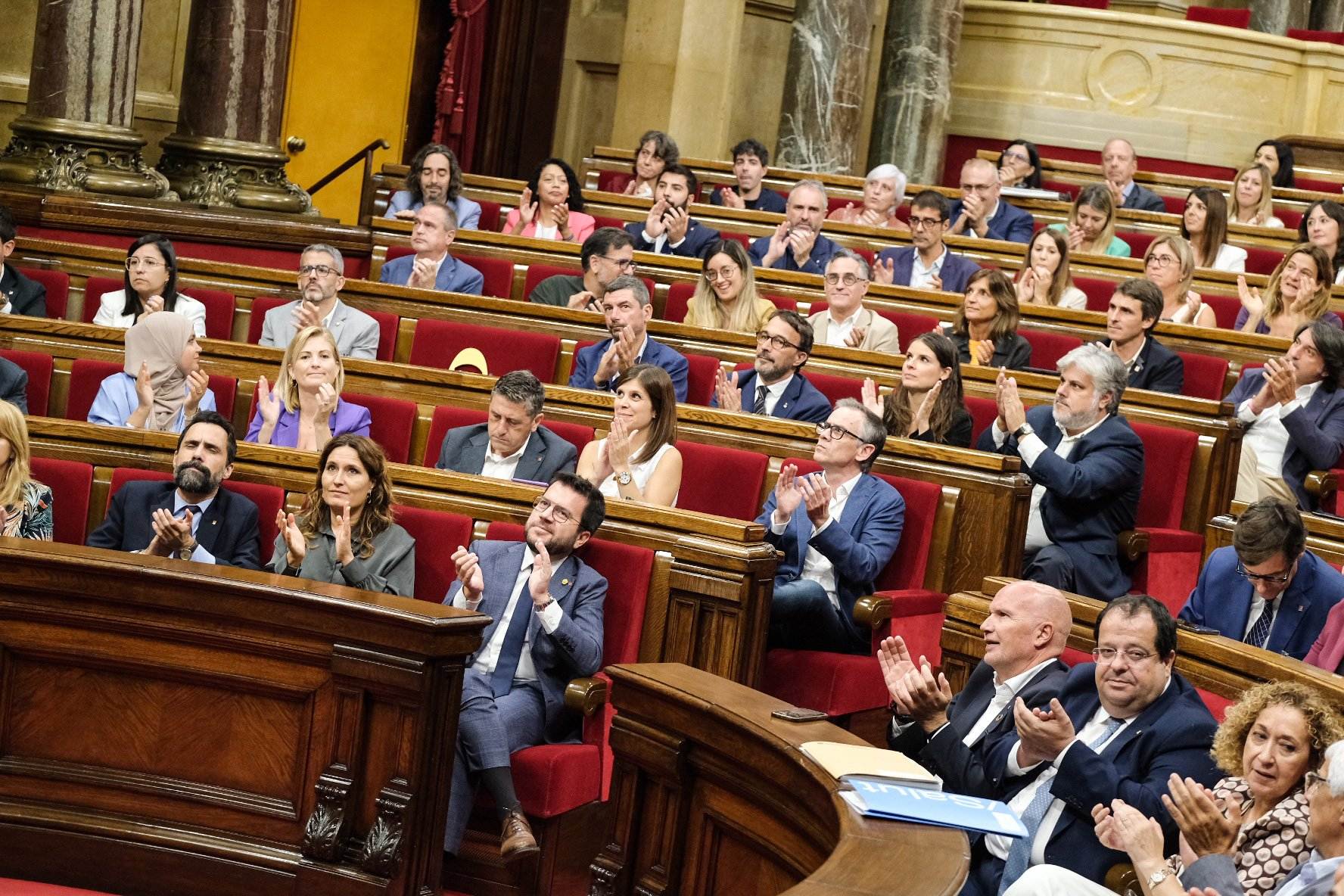An image of unity in the Catalan Parliament in defence of an amnesty law. In a context in which all eyes are already on the possibility of an investiture of Pedro Sánchez as Spanish prime minister - with the failure of Alberto Núñez Feijóo's investiture bid, as expected - sixty percent of the Catalan chamber said yes to the resolution presented by the Catalan Republican Left (ERC), Together for Catalonia (Junts) and the Popular Unity Candidature (CUP) which proclaims its support for a law that "leaves without effect [those acts] which had been classified as criminal or administrative offences, in relation to the defence of the exercise of the right to self-determination". The three pro-independence parties which proposed the motion were thus joined by the eight deputies of the Comuns, while the Catalan Socialists (PSC), Vox and the People's Party (PP) voted against. The six Ciudadanos (Cs) deputies did not participate in the vote.
The text for this motion is based on a bill that ERC, Junts and the CUP already presented to the Congress of Deputies in 2020, but which was not even admitted for hearing by the Bureau of the Spanish lower house at the time, chaired by Meritxell Batet. In fact, the motion passed this Friday suggests using the 2020 text as a basis for the proposed legislation. In addition, it urges the Catalan government and the key public institutions to "join the collective effort for the passing of this law and for the proactive monitoring of its application immediately after its approval". Regarding the scope that the law should have and whom it should include, the three signatory groups propose that "all the necessary actions" should be taken "to include all the people retaliated against for political reasons related to this case, and in defence of rights and freedoms in the context of the social and political conflict with the State".
In turn, Parliament rejected the competing resolutions put forward by Vox, Cs and the PP, who had registered texts separately urging the chamber to reject the amnesty. For its part, the PSC had presented a resolution on "dialogue in favour of coexistence", which also failed to prosper. This text urged "advancing coherently, through dialogue, along the path of re-encounter within the framework of the Constitution" and "rejecting any strategy of confrontation, division and polarization".
The amnesty, a "victory"
The four groups that voted in favour of backing an amnesty law emphasized the need for this measure in their addresses during the debate on the proposed resolutions. Marta Vilalta, of ERC, pointed out that the amnesty law is needed to "end the repression and judicialization of everything linked to self-determination". On behalf of Junts, Mònica Sales expressed her appreciation that the Comuns were voting in favour of the amnesty, but she asked them to contribute to making it "effective" beyond the gesture. In the case of the CUP, deputy Dolors Sabater highlighted the importance of including, in this same measure, the people facing retaliation for participating in "housing, anti-fascist and feminist" mobilizations. Finally, David Cid, from the Comuns, spoke of the "victories achieved" and asserted that Catalonia must not accept "the epic of defeat", but rather, the amnesty should be regarded as a "great victory".
Independence referendum motion also passes
By a narrower margin, Parliament also passed, the motion drafted in a timid exercise of unity by ERC and Junts, which sought to pressure negotiations with the Socialists: its text asserts that, if there were no progress on holding a Catalan independence referendum, agreed on with the state, there would be no investiture - not of Pedro Sánchez and nor of anyone else. This motion was validated by the Catalan chamber on Friday with the votes in favour of the two pro-independence groups and the abstention of the CUP. Specifically, the proposed resolution obtained 65 votes in favour, 54 against, 9 abstentions and six deputies who did not vote (those of Ciudadanos).
Specifically, the text transacted by ERC and Junts asserts that the resolution of the political conflict between Catalonia and the Spanish state must involve taking the "political and democratic route", thus requiring a reassertion in "defence of the exercise of the right to self-determination", that is, for Catalonia to "decide its collective future through a referendum". In addition, the text adds that the mandate that "resulted" from the referendum of October 1st 2017 can only be replaced by a referendum agreed with the state. It is precisely this point that caused the CUP to withhold its vote. For the left-wing pro-independence party, it is unacceptable to define a referendum agreed with the state as "the only strategy" for exercising the right to self-determination.

